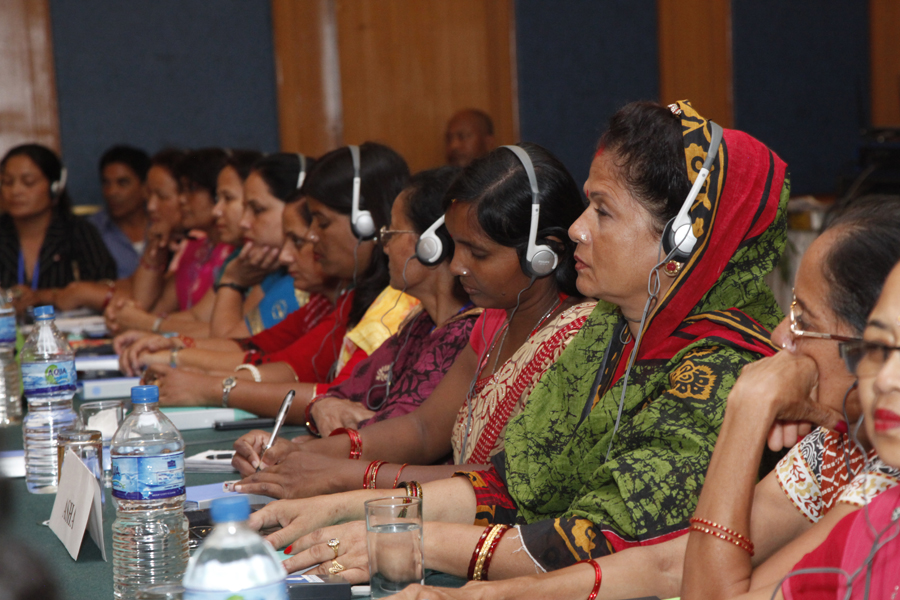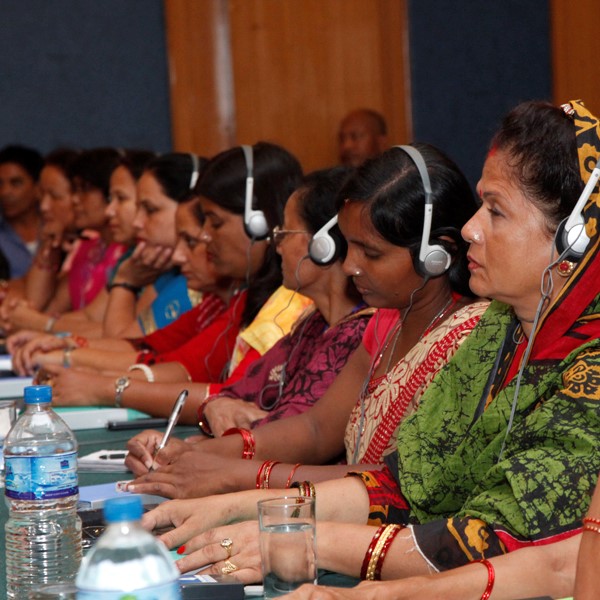
Photo: female parliamentary candidates in Nepal learn how to recruit volunteers, target voters and create campaign plans during an NDI workshop in Kathmandu.
There is growing recognition of the untapped capacity and talents of women and women’s leadership. Over the last two decades, the rate of women’s representation in national parliaments globally has incrementally increased from 11.8 percent in 1998 to 17.8 percent in 2008 to 23.5 percent in 2018. Some regions have seen particularly dramatic increases, such as Sub-Saharan Africa, where in the last 20 years the number of women in parliaments has risen from 11 to 23.6 percent, and the Arab States region, which has seen an increase from 3.1 to 17.5 percent. Total global representation is still well below the 30 percent benchmark often identified as the necessary level of representation to achieve a “critical mass” – a considerable minority of all legislators with significant impact, rather than a token few individuals – not to mention falling short of women’s representation as half of the world’s population.
The full and equitable participation of women in public life is essential to building and sustaining strong, vibrant democracies.
Accordingly, the meaningful participation of women in national, local, and community leadership roles has become an important focus on global development policy. Still, some may ask why it matters if women become political leaders, elected policymakers, or civil society activists. Why does the world need more women involved in all aspects of the political process? Women’s political participation results in tangible gains for democracy, including greater responsiveness to citizen needs, increased cooperation across party and ethnic lines, and a more sustainable future.
Women’s participation in politics helps advance gender equality and affects both the range of policy issues that get considered and the types of solutions that are proposed. Research indicates that whether a legislator is male or female has a distinct impact on their policy priorities. There is also strong evidence that as more women are elected to office, there is a corollary increase in policy making that emphasizes quality of life and reflects the priorities of families, women, and ethnic and racial minorities.
In the words of the National Democratic Institute’s (NDI) Chairman Madeleine Albright, women in power “can be counted on to raise issues that others overlook, to support ideas that others oppose, and to seek an end to abuses that others accept.”
Further, in NDI’s 35 years of work in over 100 countries around the world, we have found that, more than men, women tend to:
- work across party lines
- be highly responsive to constituent concerns
- help secure lasting peace
- encourage citizen confidence in democracy through their own participation, and
- prioritize health, education, and other key development indicators.
Women’s engagement is crucial—and it is important to recognize that women are not a homogeneous group. Depending on whether women are young or older, educated or uneducated, live in rural or urban areas, they have very different life experiences that lead to different priorities and needs. Moreover, not every woman elected to parliament or another legislative body will place women’s issues or rights at the forefront of her own agenda. Clearly, women’s representation is not the only factor, but it is a critical factor for the development of inclusive, responsive, and transparent democracies.
So, why women in politics? The positive impact of women in politics is undeniable. Kofi Annan noted, “study after study has taught us, there is no tool for development more effective than the empowerment of women. No other policy is as likely to raise economic productivity or to reduce child and maternal mortality. No other policy is as sure to improve nutrition and promote health, including the prevention of HIV/AIDS. No other policy is as powerful in increasing the chances of education for the next generation.” Further, as Madeleine Albright has stated, the world is wasting a precious resource in the dramatic underrepresentation of women in leadership positions, often resulting in the exclusion of women’s talents and skills in political life.
Male and female legislators must work together in order to solve the myriad of problems in their countries. In order to meet worldwide development goals and build strong, sustainable democracies, women must be encouraged, empowered and supported in becoming strong political and community leaders.
